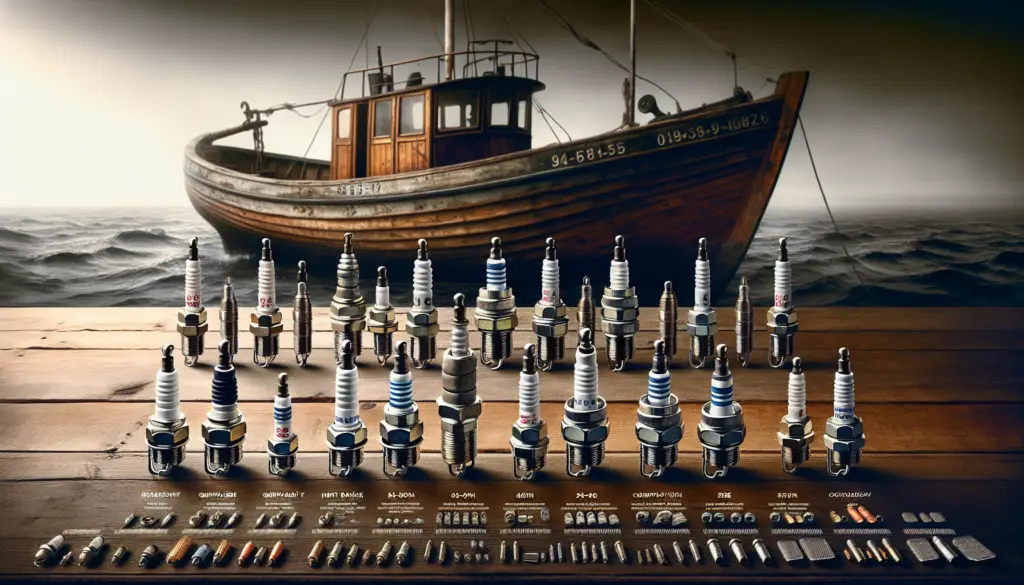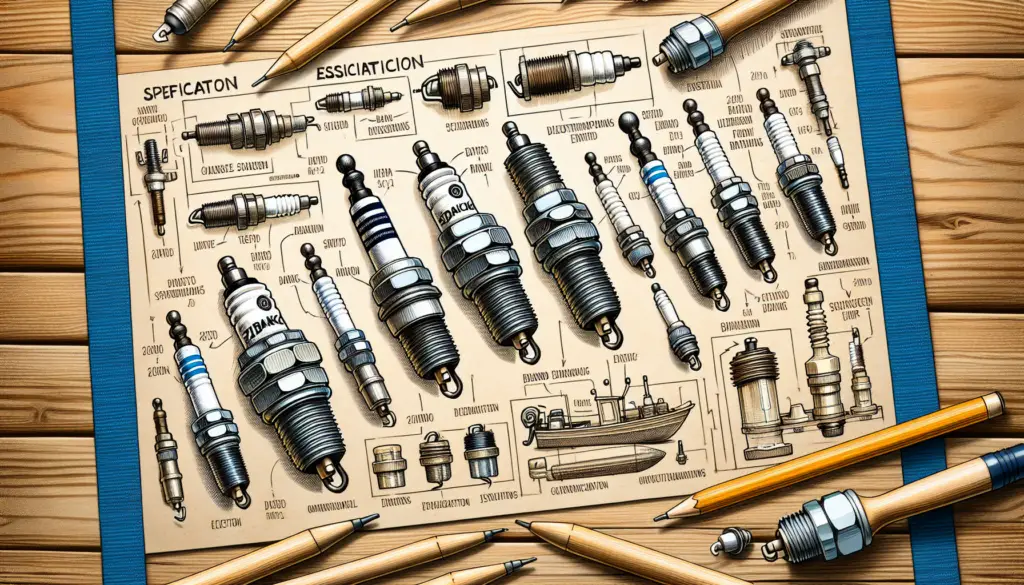You’re probably wondering how to keep your fishing boat engine running smooth and efficient. It all starts with the basics: choosing the right spark plugs. This article will guide you on how to select the best spark plugs for your fishing boat engine, ensuring peak performance every time you venture out to sea. You’ll learn about different types of spark plugs, their unique advantages, compatibility factors, and simple selection strategies. It’s all about making thoughtful choices that will amplify your fishing boat’s horsepower and reliability. Buckle in and get ready for a ride on the waves of mechanical knowledge!
Understanding the Role of Spark Plugs in Your Boat Engine
Just as a boat needs wind to sail, a boat engine requires a spark plug to function. Spark plugs are the unsung heroes of any engine, but what exactly do they do?
Function of Spark Plugs
A spark plug’s primary role is to ignite the fuel-air mixture within your boat’s engine, creating a small electric spark that starts the engine. To put it simply, without spark plugs, your boat will not start.
Importance of High-Quality Spark Plugs
Quality matters when it comes to spark plugs. High-quality spark plugs can withstand high heat and pressure inside the cylinder, and they also resist deposits and fouling. This quality will result in a reliable start-up of your boat engine time and time again, which is essential for peace of mind when out on the water.
Common Signs of Worn Out Spark Plugs
Recognizing the signs of worn-out spark plugs can save you from unexpected hassles. Symptoms may include difficulty in starting your boat’s engine, a substantial decrease in acceleration, an increase in fuel consumption, or even engine misfires. So, keep an eye out for these signs and perform regular checks.
Knowing Your Boat Engine
No two boat engines are the same, and knowing your engine can help you make the right choice when it comes to spark plugs.
Engine Types
There are quite a few engine types to consider, including outboards, inboards, stern drives, and jet drives. Each one has a specific need and operates differently.
Understanding Engine Specifications
Understanding your engine specifications is crucial to choosing suitable spark plugs. Horsepower, displacement, fuel intake, and number of cylinders are some of the key specifications to know.
How Engine Type Affects Spark Plug Choice
Your engine type will dictate your spark plug choice. High-performance engines may require more heat-resistant plugs, whereas a slower, more efficient boat might benefit from a colder plug.

Understanding Spark Plug Types
Just like engines, spark plugs also come in a variety of types, each with their unique properties and benefits.
Standard Nickel Spark Plugs
Standard nickel spark plugs are the most common type. They’re well suited to a broad range of applications, with excellent conductivity and durability.
Platinum Spark Plugs
Platinum spark plugs enable smoother starts and superior performance. Their fine-wire center electrodes provide superior ignitability and improved performance.
Iridium Spark Plugs
Iridium spark plugs provide even better performance and longevity than platinum ones. Their fine wire center electrode ensures high durability and a consistently stable spark.
Double Platinum Spark Plugs
Double Platinum spark plugs have platinum discs on both the center and ground electrodes. These plugs offer excellent longevity, even in severe conditions.
Acknowledging Spark Plug Features
A spark plug’s performance hinges on its heat range, reach and diameter, gap size, and thread size.
Heat Range
The heat range refers to the spark plug’s ability to dissipate heat. A plug’s heat range must match your engine’s operating temperature.
Reach and Diameter
Reach is the length of the threads, while diameter is the width of the plug’s threaded area. Both factors affect how well the spark plug fits into your engine.
Gap Size
Gap size is the distance between the center and ground electrode, where the spark jumps. An incorrect gap size can lead to engine misfires.
Thread Size
The thread size of a spark plug refers to its thread diameter and pitch. A plug needs to have the correct thread size to fit correctly into the cylinder head.

Criteria to Consider in Choosing Best Spark Plugs
When choosing spark plugs for your engine, consider factors like engine performance, engine longevity, fuel efficiency, price vs. performance ratio, and brand reputation.
Engine Performance
Spark plugs directly influence your engine’s performance. Your chosen spark plugs should enhance smooth engine operation and superior performing ability.
Engine Longevity
Choice of spark plugs also influences your engine’s longevity. High-quality plugs tend to last longer and promote better engine health.
Fuel Efficiency
High-quality spark plugs typically support fuel efficiency. By ensuring efficient combustion, these plugs can help your boat burn less fuel during operation.
Price vs. Performance Ratio
Cheaper plugs may seem like a good deal, but the reality is, you get what you pay for. Quality and performance often come at a higher price.
Brand Reputation
Finally, consider the reputation of the brand you’re buying your spark plugs from. Trusted brands are more likely to deliver reliable and long-lasting plugs.
Reading Spark Plug Codes
Spark plug codes contain crucial information about the construction of the plug.
Identifying Manufacturer Codes
Manufacturer codes often make up the beginning of the spark plug code, telling you who made the plug.
Understanding Heat Range Codes
Heat range codes provide guidance on a plug’s heat range. This code is usually located in the middle of the plug code.
Deciphering Gap Size Codes
The gap size code, usually found at the end of the spark plug code, provides information about the plug’s gap size.
Best Brands for Boat Spark Plugs
When it comes to spark plug brands, some stand out from the rest for their quality, durability, and performance.
NGK
NGK is a well-trusted brand in the world of spark plugs. Their plugs are known for their quality and reliability, making them a popular choice for boat engines.
Bosch
Bosch is known for their innovative, high-quality spark plugs. They offer a wide range of options suitable for many types of boat engines.
Denso
Denso is renowned for producing high-performing, durable spark plugs. Their platinum and iridium plugs are particularly favored for their longevity.
ACDelco
ACDelco is another reputable name in the spark plug industry, offering a range of plugs that deliver reliable engine performance.
Expert Recommendations for Fishing Boat Spark Plugs
Your choice of spark plugs can vary based on the size of your fishing boat.
Preferred Spark Plugs for Small Fishing Boats
Small fishing boats usually require standard nickel or platinum spark plugs for optimal performance.
Top-rated Plugs for Medium Fishing Boats
For medium-sized fishing boats, iridium spark plugs are often recommended for their superior performance and long lifespan.
Best Plugs for Large Fishing Boats
For large fishing boats, double platinum spark plugs are often the best choice. These boats are typically operated more heavily, requiring durable plugs that can withstand harsh conditions.
Inspecting and Replacing Your Boat Spark Plugs
regular spark plug inspection and replacement is crucial in maintaining your boat’s engine health.
Inspection Intervals
Ideally, spark plugs should be inspected at least once a year or every 100 hours of operation for signs of wear and damage.
Signs of Spark Plug Failure
Look out for signs of failure, such as difficulty starting the engine, decreased engine performance, increased fuel consumption, or misfires.
Steps in Replacing Spark Plugs
When it’s time to replace the plugs, make sure you have the correct tools ready, including a socket wrench and gap gauge. Remove the old spark plugs, measure the new plugs’ gap size, install them, and test your engine.
Frequently Asked Questions on Boat Spark Plugs
Browse through some FAQs to better understand your boat’s spark plugs.
When should I replace my boat’s spark Plugs?
Regular replacement is key for optimal performance. Typically, spark plugs should be replaced every 100 hours of operation or at least once per year.
Can I use car spark plugs on my boat?
Generally, using car spark plugs on boats is not recommended. Marine spark plugs are specifically designed to withstand the harsh boat environment.
What happens if I use the wrong spark plug?
Using the wrong spark plugs can lead to numerous engine problems, like misfires, poor fuel economy, and reduced engine performance.
By understanding your boat’s engine, the role of spark plugs, and how to choose and maintain them, you’ll ensure a smooth and enjoyable boating experience. Happy boating!

